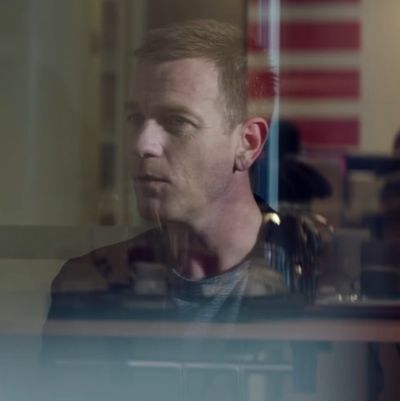
T2 Trainspotting owes us a new “Choose Life” speech, and it better be good. The original speech didn’t just kick off the first Trainspotting film; it was the centerpiece of its marketing campaign, a Generation X mantra. It was probably inevitable that a movie as nostalgic as T2 would try to re-create it, but in this case, the burden of expectation was a little too much.
To set the scene, Ewan McGregor’s Mark Renton is having dinner with Sick Boy’s girlfriend, an ambitious sex worker named Veronika (Anjela Nedyalkova), at a nice restaurant. When the conversation lulls, she brings it up. “What’s ‘choose life’? Simon says it sometimes. He says, ‘Choose life, Veronika.’” Renton laughs, like it’s a memory he hasn’t thought about in ages. “‘Choose life’ was a well-meaning slogan from a 1980s anti-drug campaign,” he explains, while the movie cuts back to the original sequence. “We used to add things to it.”
What follows is the 2017 version of the speech. “Choose Facebook, Twitter, Snapchat, Instagram, and a thousand other ways to spew your bile across people you’ve never met,” Renton tells Veronika. “Choose updating your profile. Tell the world what you had for breakfast and hope that someone somewhere cares. Choose looking up old flames, desperate to believe that you don’t look as bad as they do. Choose live-blogging from your first wank to your last breath, human interaction reduced to nothing more than data. Choose ‘10 Things You Never Knew About Celebrities Who Had Surgery.’ Choose screaming about abortion. Choose rape jokes, slut-shaming, revenge porn, and an endless tide of misogyny.”
So, yeah, it’s a dud.
Renton has 20 years of terrible things to catch up on: Iraq and Brexit, the 2008 financial collapse and Kanye interrupting Taylor Swift! Instead, the movie squanders his big moment: He’s using it not as a declaration but a come-on. Renton is trying to sleep with his friend’s girl, and in perhaps a sign that the movie was written by a middle-aged man, this speech is the thing that gets him into her bed.
That grossness aside, T2 is just the latest example of an unfortunate screenwriting trend: a movie stopping dead in its tracks so a character can complain about social media. (Considering Renton’s speech comes shortly after he and Sick Boy have had a lovely drunken night messing around with Snapchat filters, it’s particular galling in this case.) It’s a cheap way of signifying a hero’s free-thinking bona fides. Viewers need to understand that our protagonist is not like rest of the sheep out there, man. They really get it.
The problem is not restricted to bad films. In last year’s The Edge of Seventeen, Hailee Steinfeld’s emo teen wagged a finger at her peers. “My entire generation is a bunch of mouth breathers. They literally have a seizure if you take their phone away for a second,” she complains to her teacher (Woody Harrelson). “They can’t communicate without emojis. They actually think that the world wants to know that they are ‘eating a taco!’ Exclamation point, smiley face, smiley face, smiley — like we give a fuck! I am an old soul.” In another high school, Thomas Haden Church got a similar line in Easy A. “I don’t know what your generation’s fascination is with documenting your every thought … but I can assure you, they’re not all diamonds,” he tells Emma Stone. “‘Roman is having an okay day, and bought a Coke Zero at the gas station. Raise the roof.’ Who gives a rat’s ass?” He was slightly ahead of The Social Network, which had a dozen of these speeches in every scene, but at least there they were topical.
Birdman is unlike other movies for a lot of reasons, not least because Emma Stone delivers the inverse of the usual rant: “There’s a whole world out there where people fight to be relevant every day,” she tells Michael Keaton. “And you act like it doesn’t even exist! Things are happening in a place that you willfully ignore, a place that has already forgotten you. I mean, who the fuck are you? You hate bloggers. You make fun of Twitter. You don’t even have a Facebook page. You’re the one who doesn’t exist.”
(For the record, it’s entirely possible to have a narrative untouched by a social-media gag. Moonlight’s lovers reconnected without the benefit of Facebook. La La Land didn’t make Ryan Gosling send a Snapchat. The brothers in Hell or High Water didn’t even text.)
It’s also possible to handle social media well on film. Olivier Assayas’s Personal Shopper has a terrifying sequence that’s just Kristen Stewart staring at her phone, eyeing the dot-dot-dot bubble that’s sure to precede a chilling iMessage. Assayas deploys technology to show how a Skype session or phone call can divide us into two places at once. Handling it so matter-of-factly gets more about the weirdness of social media than a rant about Facebook pokes ever will. Besides, who even writes social-media updates about what they’re having for lunch anymore? If these screenwriters wanted to stay current, they’d have their main characters complain about not getting creative credit on their memes.


